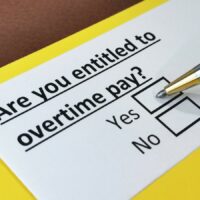Exempt vs. Non-Exempt From Overtime Pay

California law guarantees employees certain rights, including meal breaks, rest breaks, a minimum wage, and overtime pay. Not all working hours count as overtime (even if they seem like they might), and not all employees are guaranteed the right to overtime pay. Below, we discuss how overtime pay works in California and which employees are and are not covered by the overtime rules. Contact a Bay Area labor and employment attorney if you believe you’re not getting paid what you’re owed, or for help with any wage & hour or other California employment law issues.
Overtime Pay in California
In California, covered employees are guaranteed overtime pay whenever they work more than eight hours in a given workday, 40 hours in a given workweek, or seven days in a given workweek. Overtime pay starts at one and a half times the worker’s average hourly wage and increases to double their typical wage after additional thresholds have been cleared.
Under California law, employees must be paid 1.5x their typical hourly rate for:
- Hours worked past eight in a given workday
- Hours worked past 40 in a given workweek
- The first eight hours of work on the seventh consecutive day of work in a given workweek
Employees must be paid double their rate for:
- Hours worked past 12 in a given workday
- Hours worked past eight on the seventh consecutive day of work in a given workweek
Savvy employers looking to skirt the overtime rules can play with the definition of “workweek” in order to avoid paying overtime for the seventh day in a row of work.
Exempt Workers
California’s overtime rules do not apply to all people who work in the state. The rules apply by default, but there are a number of “exempt” categories of employees. Additionally, the rules apply only to “employees” and not to “independent contractors.” California law sets objective standards to evaluate whether a worker qualifies as an independent contractor or employee.
As far as employees go, the overtime rules apply to nonexempt employees. Objective criteria also apply in defining whether an employee is exempt or nonexempt; employers and employees cannot, for example, contractually agree to treat an employee as exempt if they otherwise fit the criteria of a nonexempt employee.
Certain categories of employees qualify as exempt. These include:
- Administrative, executive, and professional employees (the so-called “white collar exemption”)
- Certain employees earning commissions
- Certain other exempt professionals
The white-collar exemption applies to employees whose duties are primarily (50% or more) executive, administrative, or professional, who exercise discretion and independent judgment at work, and who earn a salary at least double the state minimum wage for full-time work. The exemption does not simply apply to all salaried employees.
Certain other categories of professionals are also exempt from California’s overtime rules. These include computer software professionals, licensed physicians and surgeons, lawyers, school teachers, and federal government employees.
Finally, employees who receive at least half of their compensation from commissions and who earn at least one and a half times the minimum wage are exempt from overtime pay.
As noted, the criteria for exempt employees are meant to be objective, not subjectively decided by employers, employees, or by agreement between the two. If you are an employee who falls outside the noted categories, then California law dictates you have the right to overtime pay for qualifying work. Talk to an experienced wage and hour attorney about your situation if you are concerned you are being under-compensated for your work.
If you are a San Francisco employee or employer with legal concerns regarding wage and hour disputes, retaliation, whistleblower protections, workplace discrimination, or other California labor law issues, contact the Richard Koss Bay Area employment law attorneys at 650-722-7046 on the San Francisco Peninsula or 925-757-1700 in the East Bay.


